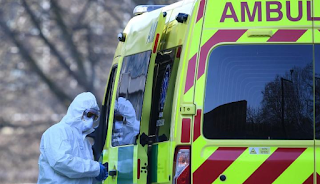London: British doctor Katie Sanderson hit breaking point over the weekend. As she advised the family of a Covid-19 patient on where their loved one should die, she received an image on her phone of crowds of people sunning themselves in a north London park.
"That made me hit a wall," the 32-year-old said, furious that members of the public were not heeding the government's social distancing advice as confirmed cases and deaths from the global Covid-19, or coronavirus, outbreak climbed in the UK. "These people are going to contribute to somebody needlessly dying in two weeks' time."
The rapidly rising number of deaths in Italy and Spain have placed Europe at the epicenter of the coronavirus crisis. Both countries now have higher death tolls than China, where the outbreak began, and with more than 7,500 fatalities Italy has the most deaths anywhere in the world.
British Prime Minister Boris Johnson said last Sunday that the UK is only "two or three" weeks behind Italy, and warned that its National Health Service (NHS) could be "overwhelmed" by the virus, like its continental European counterparts. The following day, Johnson imposed the most stringent restrictions seen in Britain since the end of World War II, after it became clear that advice about social distancing was not being adhered to.
The country's health workers are now bracing for a wave of Covid-19 patients. Sanderson's hospital, the Whittington in north London, is one of a number of UK facilities that has already attempted to scale up capacity and transform the way it is being run, in an effort to accommodate an increase of arrivals in the past week. An emergency medicine registrar at a north London hospital, Dr. Robert Lloyd, returned from holiday this week to find his department had changed radically. "Over the last few days, it is empty in the morning and in the afternoon it gets flooded, literally flooded, completely at capacity, and all patients are almost perfectly positive [for coronavirus]."This mirrors the situation at south London's King's College Hospital, which has spent weeks training staff and converting wards into intensive care units, according to a critical care worker, who wanted to remain anonymous out of concern that speaking publicly would put their job at risk. They added that the caseload "has been pretty unprecedented." King's College Hospital told CNN that it has been "training staff as required to be redeployed to support teams who are treating patients who test positive for Covid-19 as well as increasing bed capacity."
CNN has spoken to more than a dozen health workers across England -- management of the NHS is devolved to the UK's four constituent nations -- who are anxious about how the disease will run its course in the country's much-loved but chronically underfunded health service. The case numbers are already increasing rapidly at hospitals in London, where coronavirus cases are rising faster than anywhere else in the country.
King's College Hospital in south London has been scaling up for the outbreak.
Chris Hopson, head of NHS Providers, which represents hospital administrators, said London was facing a "continuous tsunami" of coronavirus patients. In an interview with BBC Radio 4 on Thursday, Hopson said London hospitals had increased critical care capacity by between five and seven times in the past few weeks, but are now struggling to meet the "explosion of demand."
In a statement to CNN, Hopson said the outbreak "is by far the biggest challenge the NHS has ever faced in its history and it is striking how everyone is pulling together to prepare for the explosion in demand that is going to come."
The critical care worker at King's said the main message that London health professionals want to get out to hospitals that have yet to be hit by cases is: "Do the preparation, because without it you won't be able to cope."




0 Comments